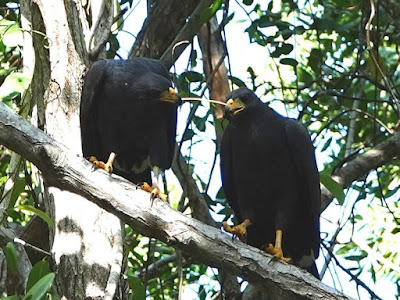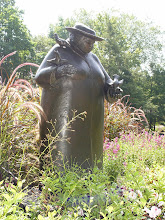Waking this morning to the news of yet another war started by humans, it was comforting to see a squadron of pelicans sailing overhead as if nothing had changed.
In their lives, most likely, nothing has, though at least one commentator has stated that Putin's aggression "changes everything" and that "we are in a different world now." It is probably more accurate to say that humans are in a different world now, a world in which the uneasy peace of the last thirty years seems to have ended and which more resembles the violent world that our species has created for far too much of its history. We have not generally been a nice species.
Here in Yucatan, the life cycle is beginning again. Birds, like this pair of common black hawks at Rio Lagartos, are engaging in courtship behavior,
 |
| Photo courtesy of Kate Fitzgerald |
and indeed, this pair mated in full view of human observers not long after this photo was taken. Hawk life must go on regardless of what humans do.
On Isla Cerritos, magnificent frigatebirds are giving up their riding of the air currents for at least a year to nest and ensure the next generation of these genuinely magnificent creatures.
 |
| Photo courtesy of Kate Fitzgerald |
In a city park in Merida, groove-billed anis are flirting and occasionally holding still for pictures.
On the beach behind my rental apartment, Yucatan's melipona bees are gathering pollen, benefiting both plants and young bees.
The rest of life goes on, doing what it does, regardless of the geopolitical machinations of humans (though war and other human activities are unquestionably bad for life forms other than ours.) This part of the world is full of reminders of rulers and societies that warred with each other, created monuments to themselves, and then vanished into the forest for a century or three.
Worth remembering.












